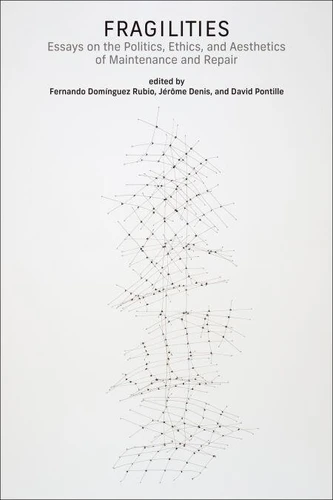Fragilities. Essays on the Politics, Ethics, and Aesthetics of Maintenance and Repair
Par : , ,Formats :
Disponible dans votre compte client Decitre ou Furet du Nord dès validation de votre commande. Le format ePub protégé est :
- Compatible avec une lecture sur My Vivlio (smartphone, tablette, ordinateur)
- Compatible avec une lecture sur liseuses Vivlio
- Pour les liseuses autres que Vivlio, vous devez utiliser le logiciel Adobe Digital Edition. Non compatible avec la lecture sur les liseuses Kindle, Remarkable et Sony
- Non compatible avec un achat hors France métropolitaine
 , qui est-ce ?
, qui est-ce ?Notre partenaire de plateforme de lecture numérique où vous retrouverez l'ensemble de vos ebooks gratuitement
Pour en savoir plus sur nos ebooks, consultez notre aide en ligne ici
- Nombre de pages286
- FormatePub
- ISBN978-0-262-38110-9
- EAN9780262381109
- Date de parution29/04/2025
- Protection num.Adobe DRM
- Taille9 Mo
- Infos supplémentairesepub
- ÉditeurThe MIT Press
Résumé
An original essay collection that explores the generative dimensions of fragility, which can help reveal new life-affirming politics and ethics. At a time when it may be easy to fall into a defeatist melancholia, if not outright pessimism, fragility offers an opportunity for a different kind of world-making. In Fragilities, Fernando Domínguez Rubio, Jérôme Denis, and David Pontille argue that we need to pay attention to the moments when the bodies, things, and worlds we inhabit begin to crack and reveal their fragility; it is in these instabilities that we can gain precious access to alternative ways of being.
The essays in this collection explore how the work of care, maintenance, and repair compose with, rather than struggle against, fragilities. Fragility forces us to reckon with the precariousness and contingency of life and to use this reckoning as a starting point to build and nurture life-affirming politics and ethics. The book explores fragility in four categories-bodies, environments, labor, and politics-and proposes to consider in each situation what/who is rendered visible, what/who is made absent, what is considered normal, and what is deemed strong and stable versus what is deemed fragile.
The volume includes a strong line-up of leading and emerging scholars from a wide array of disciplines, including anthropology, social studies of science, disabilities studies, and sociology.
The essays in this collection explore how the work of care, maintenance, and repair compose with, rather than struggle against, fragilities. Fragility forces us to reckon with the precariousness and contingency of life and to use this reckoning as a starting point to build and nurture life-affirming politics and ethics. The book explores fragility in four categories-bodies, environments, labor, and politics-and proposes to consider in each situation what/who is rendered visible, what/who is made absent, what is considered normal, and what is deemed strong and stable versus what is deemed fragile.
The volume includes a strong line-up of leading and emerging scholars from a wide array of disciplines, including anthropology, social studies of science, disabilities studies, and sociology.
An original essay collection that explores the generative dimensions of fragility, which can help reveal new life-affirming politics and ethics. At a time when it may be easy to fall into a defeatist melancholia, if not outright pessimism, fragility offers an opportunity for a different kind of world-making. In Fragilities, Fernando Domínguez Rubio, Jérôme Denis, and David Pontille argue that we need to pay attention to the moments when the bodies, things, and worlds we inhabit begin to crack and reveal their fragility; it is in these instabilities that we can gain precious access to alternative ways of being.
The essays in this collection explore how the work of care, maintenance, and repair compose with, rather than struggle against, fragilities. Fragility forces us to reckon with the precariousness and contingency of life and to use this reckoning as a starting point to build and nurture life-affirming politics and ethics. The book explores fragility in four categories-bodies, environments, labor, and politics-and proposes to consider in each situation what/who is rendered visible, what/who is made absent, what is considered normal, and what is deemed strong and stable versus what is deemed fragile.
The volume includes a strong line-up of leading and emerging scholars from a wide array of disciplines, including anthropology, social studies of science, disabilities studies, and sociology.
The essays in this collection explore how the work of care, maintenance, and repair compose with, rather than struggle against, fragilities. Fragility forces us to reckon with the precariousness and contingency of life and to use this reckoning as a starting point to build and nurture life-affirming politics and ethics. The book explores fragility in four categories-bodies, environments, labor, and politics-and proposes to consider in each situation what/who is rendered visible, what/who is made absent, what is considered normal, and what is deemed strong and stable versus what is deemed fragile.
The volume includes a strong line-up of leading and emerging scholars from a wide array of disciplines, including anthropology, social studies of science, disabilities studies, and sociology.



